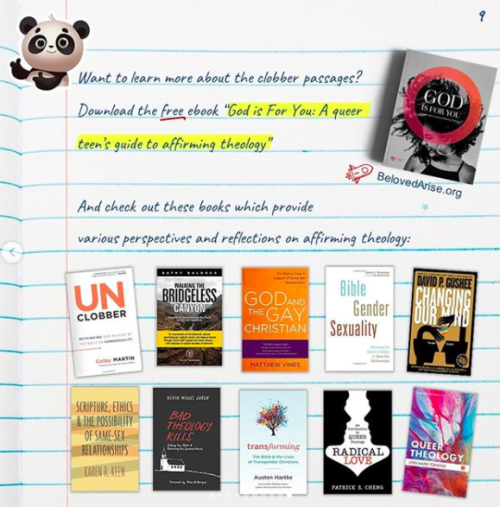#unclobber
The “Clobber” Passages
Welcome to the 4th and final post on this series on the “clobber passages”—Bible verses often used to argue that queerness is sin. We’re going to combine the last two because they both say essentially the same thing. Just like the Romans passage from last time, Paul wrote some other letters to the early church, some parts of which have been used to say that LGBTQ+ people cannot enter the kin’dom of heaven. And it all comes down to two Greek words.
1 Corinthians 6:9 & 1 Timothy 1:9-10
“Do you not know that the unrighteous will not inherit the [kin’dom] of God? Do not be deceived. Neither fornicators, nor idolaters, nor adulterers, nor homosexuals, nor sodomites, nor thieves, nor covetous, nor drunkards, nor revilers, nor extortioners will inherit the [kin’dom] of God.” 1 Corinthians 6:9-10 (NKJV)
In appeal to the new church in Corinth, Paul compares believers to the outside culture. He presents a list of sinful actions to say essentially: “You’re better than this.”
“…for those who kill their fathers or mothers, for murderers, for the sexually immoral, for those practicing homosexuality, for slave traders and liars and perjurers—and for whatever else is contrary to the sound doctrine.” 1 Timothy 1:9-10
Similarly, in a letter to his friend/mentee Timothy, Paul presents yet another list of sinful actions to watch out for.
Non-Affirming View
Non-affirming folks interpret these verses as a clear, unquestionable biblical condemnation of queerness. Some assert that “homosexuals” and “those who practice homosexuality” are unrighteous just like murderers and adulterers, and LGBTQ+ people who don’t repent of these sexual sins cannot get into heaven. Some even conclude that straight Christians are also sinning just by affirming LGBTQ+ people:
“We affirm that it is sinful to approve of homosexual immorality or transgenderism and that such approval constitutes an essential departure from Christian faithfulness and witness.” “The Nashville Statement” The Council on Biblical Manhood and Womanhood
Affirming View
Affirming folks argue these verses have been mistranslated. The reality is Bible translators have interpreted these verses in 1 Corinthians and 1 Timothy in different ways. For example, the writers of the New King James Version (1979) decided to use the word “homosexual” in 1 Corinthians, but other widely accepted Bible translations decided “homosexuals” was not accurate, and instead used other words.
“Effeminate” (New American Standard Bible, 1963)
“Sexual perverts” (Revised Standard, 1971)
“Boy prostitutes” (New American Bible, 1970)
“Male prostitutes” (New Revised Standard Version, 1989)
“Sodomites” (New American, 1941)*
*Check out our slide guide on Sodom and Gomorrah for the context on “sodomy.”
It Happened in 1946
The word “homosexual” did not exist in the Bible until a group of American translators put it in there in 1946. The writers of the Revised Standard Version (RSV) were the first to mistakenly use the word “homosexual” in lieu of the Greek words “malakoi” and “arsenokoitai” in these verses. They later admitted this error and published a revision of the RSV in 1971 where “homosexuals” was replaced with “sexual perverts.” But it was too late; by then, the RSV’s (mis)use of the word “homosexuals” was adopted by other popular translations of the Bible—reinforcing an enduring societal myth that queerness is ungodly.
“Malakoi”
So let’s unpack the two Greek words the RSV mistakenly translated as “homosexual.” The first word, “malakoi,” means soft (as in clothing). When applied to people, it describes weakness, laziness, cowardice, or lack of self-control. It was a generic insult for anything considered feminine because, in those times, women were often seen as “soft” or lacking control over their desires and feelings. Affirming folks believe Paul is referring to people who lacked self-control. Here’s how one translation puts it:
“Those who use and abuse each other, use and abuse sex, use and abuse the earth and everything in it, don’t qualify as citizens in God’s [kin’dom].” 1 Corinthians 6:9-10 (The Message)
“Arsenokoitai”
The second word, “arsenokoitai,” is a very rare compound word (literally “male” and “bed”) probably made up by Paul. Because of the contexts in which Paul uses this term, affirming folks argue that Paul is referring to exploitative same-sex practices common in his time: prostitution, pederasty*, and sex with enslaved men. Affirming folks point out that loving, committed same-sex relationships between equals did not exist during this time, and therefore, Paul was NOT talking about modern same-sex dynamics, such as queer marriages.
*sex between men and boys
Conclusion
1 Corinthians 6 and 1 Timothy 1 should NOT be used to “clobber” LGBTQ+ people. What Paul condemns are abusive and exploitative behaviors—not queer identity or healthy, loving queer relationships.
As we said at the beginning of this series, there is absolutely nothing in the Bible that suggests a person’s sexual orientation or gender identity prohibits them from being a follower of Christ. These “clobber” passages, when put in appropriate context, actually reveal valuable insights for God’s people, teaching us to help the vulnerable, to care for each other, to practice the way of LOVE.
To see the post in slide-guide form, go here.
Post link
The “Clobber Passages”
This is part 3 of our series on the Bible passages used by some Christians to exclude LGBTQ+ people. This next “clobber” passage from Romans is probably the one most non-affirming people refer to when they say “the Bible is clear on this…” Romans is a letter written by the apostle Paul to the Christian church in Rome. After a greeting and introduction, Paul writes about the righteousness of God, describing what life is like without God. And then the “clobber” verse…
“For this reason God gave them up to degrading passions. Their women exchanged natural* intercourse for unnatural, and in the same way also the men, giving up natural* intercourse with women, were consumed with passion for one another. Men committed shameless acts with men and received in their own persons the due penalty for their error.”
Romans 1:26-27 (NASB)
Non-Affirming View
Non-affirming Christians interpret these verses as an indictment on same-sex relationships. They assume that Paul is critiquing same-sex behavior and same-sex relationships. As such, they conclude that Paul is saying that heterosexuality is the only good and natural orientation in God’s eyes.
Affirming View
Affirming Christians, including many biblical scholars, interpret these passages as an indictment on extreme idolatry and excessive behavior. Paul is describing a group of people who have deserted God and abandoned their decree to love God, neighbor, and self. These folks have fallen into extreme idolatry and have become obsessed with their own passions and desires. When he talks about sexual behavior here, Paul is actually critiquing married heterosexual men and women, not gay people. They were so consumed by lust that they were no longer satisfied with their marriages and abandoned their natural inclination for their partners.
A People Who Have Lost Their Way
Paul is talking about people who had fallen into extreme pagan idolatry and stopped worshipping God. Romans 1:25 says “They exchanged the truth of God for a lie and worshipped and served the creature rather than the creator.” And, because of this, they did unhealthy things to each other—cheating, stealing, backstabbing, killing. And some turned sex into a meaningless act of self-gratification—no romance, no companionship, no beauty, no love. These passages are a warning (similar to the Sodom story) about what happens to communities when people lose their love for God and for each other.
“Natural” and “Unnatural”
What does Paul mean when he refers to intercourse as “natural” or “unnatural?” Does this mean that queerness is unnatural and against God’s order? Affirming theologians argue that Paul uses “natural” (physis in Greek) to mean “customary.” For example, 1 Corinthians 11, Paul says it’s natural (physis) for men to have short hair, and that men who have long hair are disgraceful.* Do Christians today conclude all long-haired men are unnatural and disgraceful to God? No, because we understand that Paul is referring to customs in his culture. Paul’s comments in Romans 1:26-27 (which uses the same Greek words) are references to custom.
*”Disgraceful” is the same word translated “degrading” in Romans 1:26.
Not Gay vs Straight, But Excess vs Moderation
“Paul is not condemning being gay as opposed to being straight. He is condemning self-seeking excess as opposed to moderation—a concern made clear by his repeated use of the term “lustful,” and by his description of “exchanging” or “abandoning” heterosexual sex.” Matthew Vines, The Reformation Project
Paul is NOT critiquing same-sex relationships; he is NOT condemning consensual, loving, committed same-sex relationships. What Paul is condemning is idolatry which has led to excessive, greedy, indulgent, love-less sexual behavior.
Conclusion
Romans 1:26-27 is a warning against idolatry, which drove a group of people to excessive behaviors, including abusing themselves and each other sexually (which falls outside the confines of their natural state.)
Romans is NOT an indictment of same-sex behavior or queer relationships. As such, these passages are gravely misused as “clobber” texts to condemn the LGBTQ+ community.
To see the post in slide-guide form, go here.
Post link




